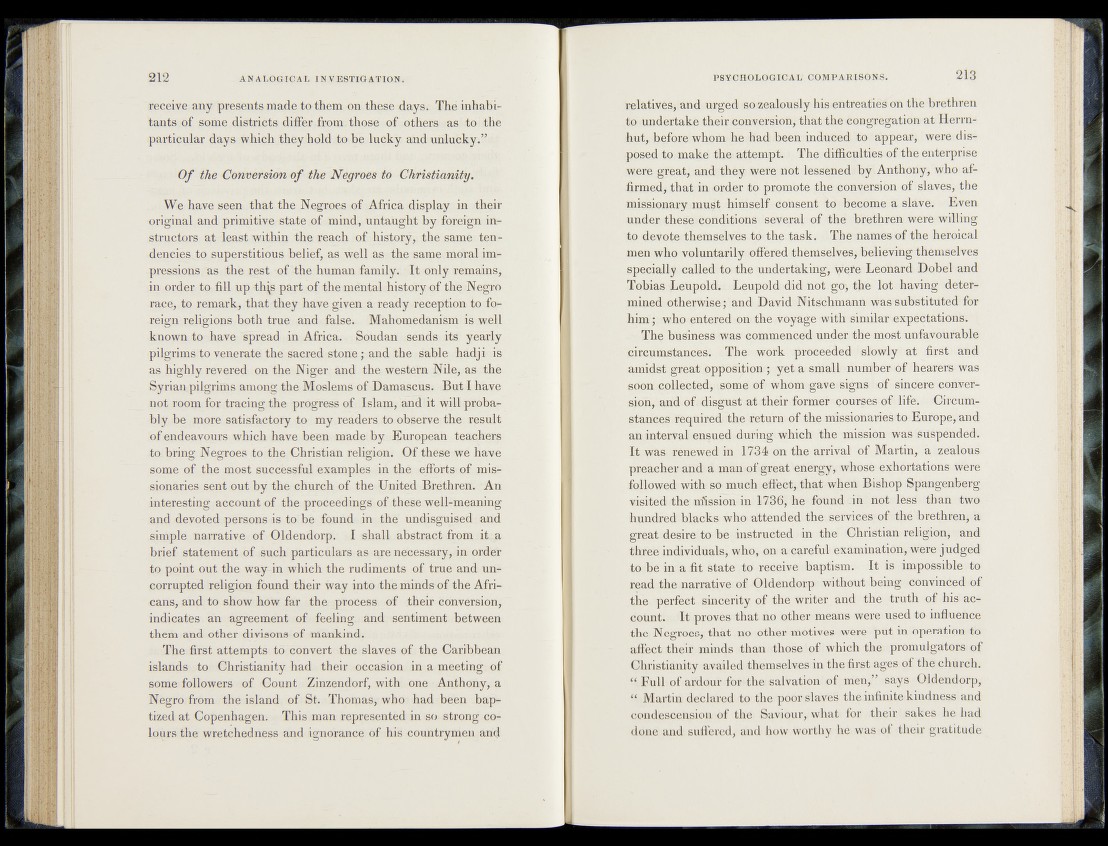
receive any presents made to them on these days. The inhabitants
of some districts differ .from, those of others as to the
particular days which they hold to be lucky and unlucky.”
O f the Conversion o f the Negroes to Christianity.
We have seen that the Negroes of Africa display in their
original and primitive state of mind, untaught by foreign instructors
at least within the reach of history, the same ten-
dencies.to superstitious belief, as well as the same moral impressions
as the rest -of the human family. I t only remains,
in order, to fill up thjs part of the mental history of the Negro
race, to remark, that they have given a ready ^reception to foreign
religions both true and ialse. Mahomedanism is well
known to have spread in Africa. • Soudan sends its yearly
pilgrims to venerate the sacred stone ; and the sable hadjiois
as highly revered on the Niger and the western Nile, as the
Syrian pilgrims among the Moslems of Damascus. But I have
not room for tracing the progress of Islam, and it wiUproba-
bly. be more satisfactory to my readers to observe the result
of endeavours which have been made b y . European teachers
to bring Negroes to the Christian religion. Of these we have
some of the most successful examples in the efforts-of misf
sionaries sent out by the church of the United Brethren. An
interesting account of the proceedings of these well-meaning
and devoted persons is to be found-jn the undisguised. and
simple narrative of Oldendorp. I shall abstract from it,ja
brief statement of such particulars as are necessary, in order
to point out the way-in which the rudiments of true and uncorrupted
religion found their way into the minds-of the Africans,
and to show how far the process of their conversion,
indicates an agreement of feeling, and sentiment between
them and other divisons of mankind.
The first attempts to convert the slaves of the Caribbean
islands to Christianity had their occasion in a meeting, of
some followers of Count Zinzendorf, with one Anthony, a
Negro from the island of St. Thomas, who had been baptized
at Copenhagen. This man represented in so strong colours
the wretchedness and ignorance of his countrymen and
relatives, and urged so zealously his entreaties on the brethren
to undertake their conversion* that the-congregation at Herra-
hut, .before whom/he had been induced to appear, were disposed
to make the attempt. The , difiioulties.of th e enterprise
were grèatpand they were not lessened^ b y . Anthony, who affirmed,
that in order to promote the conversibn of slaves, the
missionary must himself consent xd become a slave. Even
under, thesPiconditions seVeral of the brethren were willing
to devote them selves to the task. The names of the heroical
men who voluntarily offered themselves; believing themselves
specially called to the undertakings \yetc Leonard Dobel and
Tobias Leupold.. Leupold: did hot .gd*, the lot having determined
otherwise; and David-Nitschmann was substituted for
him ; who-entered' omthe woyage with similar«xpectationb.~ ff
- The business iwas commenced under the£müshmifavotifable
.circumstances. ;The work proceeded slowly at first and
amidst great opposition; yet a small nui^bemof . heaTerS was
sdoniColleeted, .some ofi whómgave- signs . of sinc^e conversion,
and of ^disgust <at their former courseslofI life. Circumstances
.required the return of the -missionarièârtoiEurope, and
an intervalensued; during which the mission wasisüspènded.
It was -renewed in 1734 on the arrival of Martin, â tzeaious
preacher and a man of great energy,whosé exhortations; were
followed with so much effect, that when Bishop Spangenberg,
visited the*m%si5ffin 1786) he found .in not less than two
hundred blacks who: attended the services- of the brethren, a
great desire to be instructed in the! Christian > religion, and
three individuals, who, on a careful examination, were judged
to be in a fit state to receive baptisms It is ;impoSsible to
read the narrative of Oldendorp without being -convinced-of
the perfect sincerity of the writer and the truth of his. account.
It proves that no other means were used to influence
the Negroes, that no other motivés-were put in operation to
affect their minds than th o se ! of which the promulgators of
Christianity availed themselves in the first-ages of the' chh-rch.
“ Full: of ardour for-the- salvation of men,” says - Oldendorp,
“ Martin declared to the poor slaved thednfinite kindness and
condescension of the Saviour, what for their sakes he had
done and suffered, and how worthy he was of their gratitude’